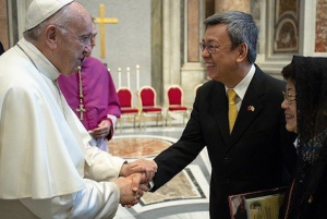By Dr. Jeff Mirus ( bio – articles – email ) | Feb 15, 2022
A former German prefect of the Congregation for the Doctrine of the Faith has stated that faithful Catholics are going through “a time of tribulation and psychological terror” owing to leadership by cardinals, bishops and theology professors who do not believe what the Church teaches. This assertion was made by Cardinal Gerhard Müller in an interview with the National Catholic Register, and while those who frequent CatholicCulture.org will not find it surprising, the problem has rarely been described more strongly by a high-ranking prelate.
Cardinal Müller is speaking partly in light of the immense scandal that is the German synodal path, a process very quickly used to advantage by those who really do not accept the truths taught by the Catholic Church. But what has happened in Germany reflects larger, if marginally more subtle, trends throughout the Western world since the first half of the twentieth century. Beginning with the rise of Modernism in the universities, endemic unfaithfulness exploded into public view as Western culture rapidly secularized in the period following World War II, a cultural process which finally became dominant and obvious to everybody by the mid to late 1960s. Huge numbers of universities, seminaries, and religious communities rejected the Catholic faith along the way, while unfortunately generally retaining the Catholic name.
Synodality redux
There can be no question, of course, that the response to this rampant secularization ought to be a missionary response by Catholics on every level to both the larger society and the non-believers who choose to remain within the Church. Such a response would clarify matters almost immediately, since so many who seek to remake the Church in their own worldly image would be prompted to either convert or depart. Moreover, this missionary movement, to gain maximum effectiveness, should certainly express itself “synodally”, that is, by a coming together of every part and level of the Church in both adherence to and expression of the Gospel of Jesus Christ, of which the Church is the sole defining repository.
At the same time, however, those with any experience at all recognize how often ideas which sound good in theory are more or less deliberately allowed to be hijacked by non-believers within in order to further paralyze the Body of Christ, bringing Church policy into ever-greater alignment with the falsehoods espoused by the dominant secular culture. It is this process, as evidenced overwhelmingly in the German Synodal Path, to which Cardinal Müller refers.
Given (a) the history of the Church in the West since the 1960s; and (b) the disastrous example set by the over-eager German synodal path, it is even more difficult to greet the Church-wide synodal process with that looney positivity which characterizes those who hope to use it—once again—to make the Church less faithful to her mission. One shudders at the ever-increasing emphasis on including more and more people in the preparatory synodal discussions—first all practicing Catholics (whether or not they would be willing to make a profession of Faith, I suppose), next those who have fallen away, then on to other Christian groups, and finally including anyone else who might wish to make observations about the future priorities for improvement of that Church which alone encompasses all the gifts given by God to draw us into eternal union with Himself.
One has a sense of what Yogi Berra called “déjà vu all over again.” God’s offer is made, but we need to get everyone’s input before we can decide what to do.
Friends with benefits?
Now, of course, this whole outlandish mechanism is full of possibilities. There are possibilities for good, but the problem is that such a process is also full of probabilities. This is really a matter of percentages. Based on past results in our unusual era of broad (and often contrived) consultation, there remains only a very slim chance for an alignment of the two necessary stars: First, an overwhelming upsurge of demand for a Church more faithful to Christ in accordance with her own authentic self-understanding; second, the transmission of that demand into clear proclamation and coherent action by the pope and the bishops who bear primary responsibility for a guided renewal of an authentically synodal Church.
An authentically synodal Church, by the way, is simply a Church which, as the common expression goes, “has really got it together.” And getting it together means allowing ourselves to be transformed by grace until we are an inseparable part of the Body of Christ.
But the largest probabilities remain: (a) That the overwhelming majority of highly-committed Catholics will (based on long experience) distrust the process; (b) That those who are fashionably dissident will take the opportunity to remake the Church in their own image; (c) That nearly every expressed concern will be translated by professional ecclesiastics into high-sounding phrases which emphasize inclusion over fidelity; and (d) That the very presence of nearly all suggestions in some final document will, by the planting of small new seeds of infidelity, give added legitimacy to the latest ways in which the Church can become less faithful to her essential mission.
The weakness characteristic of synodal processes as conceived in the modern world is the relative unlikelihood that effective and authentic Catholic leadership will emerge at any stage to guide the process. This leadership is particularly necessary when it comes to discerning when a point that has been raised calls for the inclusion of that point or the proper antidote to that point in the final response by the Church as a whole. In case this is too abstract, let me provide just one example: If a desire is raised for greater inclusion in the Church of LGBTQ (etc.) concerns, does that become a synodal bullet point for welcoming those committed to LGBTQ lifestyles or for developing an effective mission to those whom Christ is calling to abandon these erroneous and sinful lifestyles?
The same question, of course, can be asked concerning those who embrace lifestyles rooted in heterosexual sin—such as cohabitation and contraception. (And now you know why my subtitle for this section is Friends with benefits—followed by a question mark.)
A new counter-reform
I’m not satisfied by the terminology, but what the Church most needs today is a new counter-reformation. The so called Protestant Reformation was, of course, a revolt against the Church and, to that degree, a revolt against Jesus Christ. But because so many scholars called this a “reformation” rather than a “revolt”, the movement for a much-needed Catholic reform eventually became known as the “counter reformation”. We are in this same counter-cultural position today. The worldly might well refer to any developments favorable to their own errors as “renewal”. But if so, we will have to continue the effort to mount a “counter renewal”, by which I mean a renewal which strengthens faith and increases openness to grace.
That effort is made all the more difficult by the common unwillingness of so many in high places to remove themselves from the Church when they have lost their faith. Still, it is not inconceivable that this grand synodal process undertaken by Pope Francis will bear good fruit. If we were dealing with human odds, the outcome would be sadly predictable. But it is rather as Our Lord said: “With men this is impossible, but with God all things are possible” (Mt 19:26).
Either way, we will be able to tell something about the health of the tree of the Church by the fruit she bears in this laborious synodal process. And when the process is completed, for better or worse, we can also pray year by year that God will allow us to continue the work of increasing the Church’s fruit:
And he told this parable: “A man had a fig tree planted in his vineyard; and he came seeking fruit on it and found none. And he said to the vinedresser, ‘Lo, these three years I have come seeking fruit on this fig tree, and I find none. Cut it down; why should it use up the ground?’ And he answered him, ‘Let it alone, sir, this year also, till I dig about it and put on manure. And if it bears fruit next year, well and good; but if not, you can cut it down.’” [Lk 13:6-9]
This passage, of course, does not apply perfectly to the Church, which is an extension of Christ Himself, and so always bears more fruit than we know, however marred and disfigured she may appear. Still, there is the human element, and the historical end of even the Church’s saving power will come one day, which means we must work tirelessly to maximize her fruitfulness. Therefore we make the vinedresser’s prayer our own, except that we shamelessly beg year after year, repeating our prayer even after death so that (as St. Thérèse of Lisieux also promised) we will use our heaven doing good on earth.
Sound Off! CatholicCulture.org supporters weigh in.
All comments are moderated. To lighten our editing burden, only current donors are allowed to Sound Off. If you are a current donor, log in to see the comment form; otherwise please support our work, and Sound Off!

Join Our Telegram Group : Salvation & Prosperity









